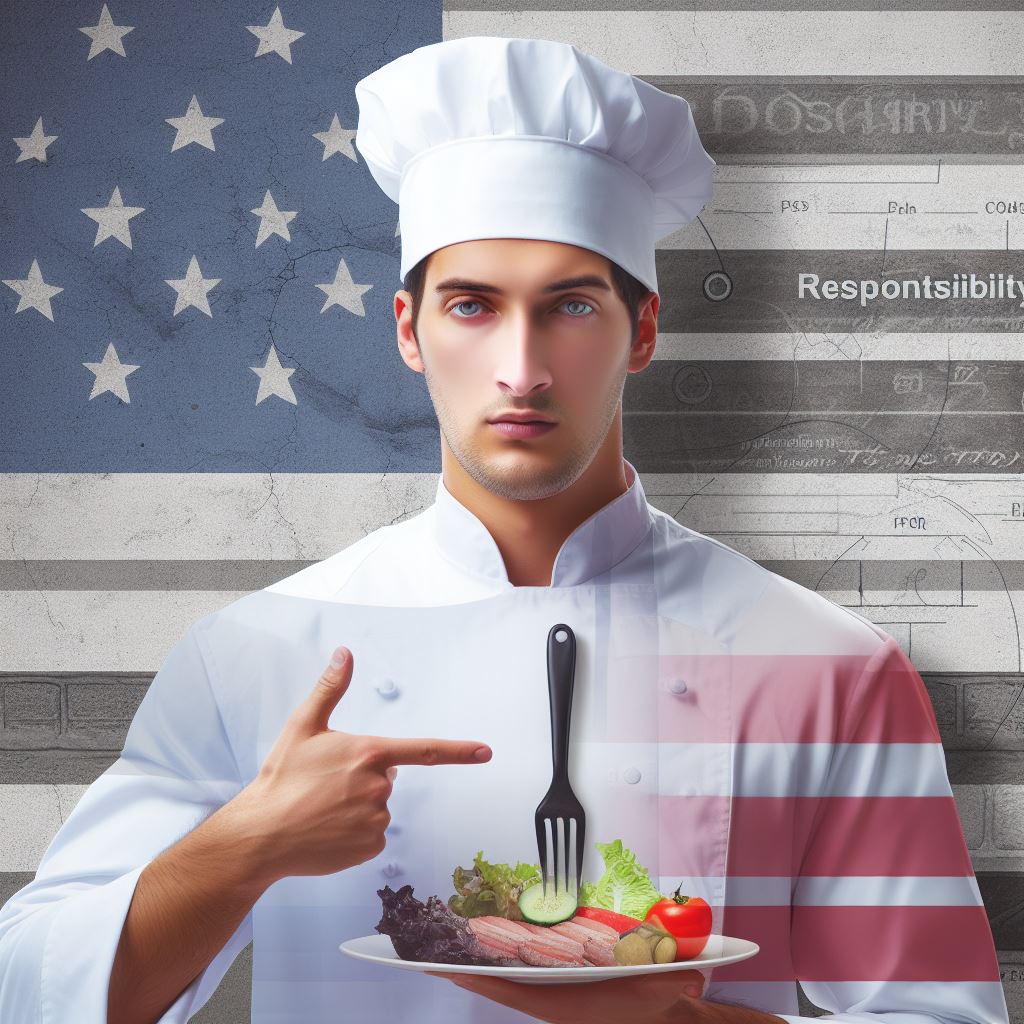Nutrition & Health: The Responsibility of Modern US Chefs
Last Updated on November 5, 2023
Introduction
Nutrition and health are important topics in the culinary industry.
In the culinary industry, nutrition and health play a significant role.
It is no longer just about creating delicious dishes; chefs also have a responsibility to promote healthy eating habits.
As individuals become more aware of the impact of diet on overall well-being, chefs are looked upon to provide nutritious options and educate their customers.
Gone are the days when chefs were solely focused on taste and presentation.
Today, they are expected to be knowledgeable about the nutritional value of ingredients and make conscious choices while creating menus.
By incorporating healthy alternatives and reducing the use of unhealthy ingredients, chefs can impact the health of their patrons positively.
Modern US chefs have a responsibility to promote healthy eating habits.
Modern US chefs have an influential position and can shape dietary preferences.
By offering nutritious options that are still delicious, they can encourage people to make healthier choices.
Chefs can use their creativity to develop dishes that are both attractive and packed with essential nutrients.
Moreover, chefs can play a vital role in educating the public about the importance of a balanced diet.
They can organize cooking classes or demonstrations that teach people how to prepare healthy meals at home.
By sharing their expertise, chefs can empower individuals to take control of their own health.
Therefore, nutrition and health have become crucial concerns in the culinary industry.
Modern US chefs have a responsibility to promote healthy eating habits by offering nutritious options, reducing the use of unhealthy ingredients, and educating the public about balanced diets.
As chefs embrace this responsibility, they contribute to the well-being of their patrons and society as a whole.
The Impact of Chefs on Public Health
The influence chefs have on shaping dietary choices
Chefs play a vital role in shaping dietary choices as they create recipes that inspire people to try new flavors and cuisines.
With their innovative culinary techniques, chefs can make healthy meals delicious, encouraging individuals to choose nutritious options.
Their expertise and creativity can transform mundane ingredients into delectable dishes, making healthier choices more appealing.
Furthermore, chefs often have a celebrity status, which gives them a powerful platform to influence people’s eating habits positively.
By promoting balanced meals and highlighting the benefits of specific ingredients, chefs can guide individuals towards healthier dietary choices.
The significance of chefs being knowledgeable about nutrition
Being knowledgeable about nutrition allows chefs to understand the impact of different ingredients on individuals’ health.
They can develop recipes that meet specific dietary needs, catering to individuals with allergies, intolerances, or medical conditions.
Chefs who are well-versed in nutrition can create menus that provide essential nutrients while minimizing the consumption of unhealthy ingredients.
Moreover, their understanding of portion sizes and calorie counts enables them to offer balanced meals to promote overall well-being.
When chefs are knowledgeable about nutrition, they can help prevent diet-related diseases and promote healthier lifestyles.
Statistics on the rising rates of obesity and chronic diseases in the US
In recent years, obesity rates in the United States have reached alarming levels.
According to the Centers for Disease Control and Prevention (CDC), obesity affects approximately 42.4% of adults in the US.
In addition to obesity, chronic diseases such as heart disease, diabetes, and certain cancers have also been on the rise.
The CDC reports that nearly half of all adults in the US suffer from at least one chronic disease.
These statistics emphasize the urgent need for interventions to promote healthier eating habits and prevent further health complications.
By actively engaging chefs in the conversation about nutrition and health, we can combat the alarming rise in obesity and chronic diseases in our society.
Through their influence on dietary choices and their knowledge of nutrition, chefs bear great responsibility in promoting public health.
By using their creativity and culinary skills, they can inspire individuals to consume nutritious meals.
With the rising rates of obesity and chronic diseases, it is crucial that chefs prioritize health-conscious cooking.
By becoming more knowledgeable about nutrition and implementing healthier options in their menus, chefs can make a significant impact on society’s well-being.
It is essential for chefs to collaborate with healthcare professionals and scientists to ensure accurate and up-to-date information.
Together, they can develop strategies to combat the negative health trends in the US and encourage healthier dietary choices.
By uniting their expertise, chefs and public health officials can create a healthier food culture that benefits individuals and communities.
It is time for chefs to take on the responsibility of shaping nutrition and health in modern society, creating a positive impact on public health.
Read: Challenges and Triumphs: Anecdotes from Chefs Across the US
Incorporating Nutritional Education in Culinary Schools
The importance of nutrition education for aspiring chefs
- Nutrition education is crucial for aspiring chefs to create healthy and balanced meals.
- It helps chefs understand the impact of food on the body and promote overall well-being.
- With proper knowledge, chefs can cater to various dietary needs and preferences of customers.
- Nutrition education empowers chefs to make informed decisions about ingredients and cooking techniques.
- It instills a sense of responsibility towards the health and well-being of diners.
How culinary schools can incorporate nutrition courses into their curriculum
- Culinary schools can introduce dedicated nutrition courses as part of their culinary programs.
- These courses should focus on the principles of nutrition, dietary guidelines, and health implications.
- Hands-on practical sessions can be incorporated to demonstrate the application of nutrition knowledge in cooking.
- Collaborations with nutrition experts and dieticians can provide valuable insights to aspiring chefs.
- Integrating nutrition education throughout the curriculum, including theory and practical components.
The benefits of chefs having a strong foundation in nutrition knowledge
- Chefs with nutrition knowledge can create menus that cater to specific dietary needs and restrictions.
- They can develop innovative and flavorful recipes without compromising on nutritional value.
- Understanding nutrition allows chefs to make healthier ingredient choices, reducing the risk of chronic diseases.
- With proper nutrition knowledge, chefs can educate their staff and promote a healthier work environment.
- It enables chefs to contribute significantly to the wellness and overall health of their customers.
By incorporating nutrition education into culinary schools, aspiring chefs can enhance their culinary skills while prioritizing the well-being of their customers.
Nutrition courses provide chefs with the necessary knowledge to create healthy and delicious meals, cater to various dietary needs, and make informed decisions about ingredients and cooking techniques.
Culinary schools can introduce dedicated nutrition courses that cover the principles of nutrition, dietary guidelines, and health implications.
They can also provide hands-on practical sessions to demonstrate the practical application of nutrition knowledge in cooking.
Collaborations with nutrition experts and dieticians can further enhance the learning experience.
Having a strong foundation in nutrition knowledge benefits chefs in numerous ways.
They can create menus that cater to specific dietary needs and restrictions, develop recipes that are both flavorful and nutritionally balanced, and make healthier ingredient choices to reduce the risk of chronic diseases.
Chefs with nutrition knowledge can also educate their staff and promote a healthier work environment.
Overall, incorporating nutrition education in culinary schools equips chefs with valuable skills and knowledge to create meals that prioritize health and well-being.
By understanding the impact of food on the body and making informed decisions, chefs can contribute to a healthier society and enhance the dining experience for their customers.
Read: A Historical Journey: The Evolution of Chefs in the USA

Implementing Healthier Menus and Cooking Techniques
Chefs play a crucial role in offering healthier menu options by incorporating nutritious ingredients.
- Chefs can include more fruits and vegetables in their dishes, providing essential vitamins and minerals.
- They can use whole grains instead of refined grains to increase fiber content and promote better digestion.
- Choosing lean cuts of meat and poultry and reducing added fats can lower the calorie and fat content of meals.
- Incorporating plant-based proteins like tofu, tempeh, and legumes can provide a healthier alternative to animal-based proteins.
Chefs can utilize various ingredient substitutions and cooking techniques to promote health.
- Instead of using butter or oil, chefs can use healthier fats like olive oil or avocado oil.
- They can opt for low-sodium alternatives or herbs and spices to enhance flavors instead of excessive salt.
- Choosing grilling, steaming, or baking methods over deep frying can reduce the amount of added fats and calories.
- Chefs can experiment with different cooking methods to retain maximum nutrients in the food.
Healthier menus have the potential to enhance customer satisfaction and loyalty.
- When customers have access to nutritious options, they are more likely to feel satisfied and well-nourished.
- Offering healthier choices can attract health-conscious individuals who appreciate establishments that prioritize their well-being.
- Customers are more likely to return to restaurants that prioritize their health, building loyalty and positive word-of-mouth.
- The promotion of healthier menus can also create a positive image for chefs and their establishments.
Most importantly, chefs have a significant responsibility in providing healthier menu options and promoting cooking techniques that prioritize nutrition and health.
By incorporating nutritious ingredients, utilizing substitutions, and implementing healthier cooking methods, chefs can positively impact customer satisfaction, attract health-conscious individuals, and build loyalty.
The choices made by chefs can contribute to a healthier population and a more conscientious food industry as a whole.
Read: Top Culinary Schools: Best Chef Training in the USA
Collaborating with Nutrition Experts and Dieticians
The importance of chefs working with nutrition experts and dieticians
- Chefs should recognize the value of partnering with nutrition experts and dieticians.
- By working together, chefs and nutrition experts can create meals that promote health.
- Nutrition experts and dieticians can provide valuable insights on nutritional guidelines and requirements.
- Collaboration ensures that dishes are not only delicious but also meet dietary needs.
- Working with professionals allows chefs to expand their knowledge and skills in nutrition.
The benefits of collaboration in creating nutritious and delicious dishes
- Collaboration between chefs and nutrition experts results in the development of healthier recipes.
- Nutrition experts can suggest alternative ingredients and cooking methods to improve dish nutrition.
- Chefs can learn new techniques and ingredients from dieticians to enhance the taste of their creations.
- Collaboration ensures that meals are not only satisfying but also contribute to overall well-being.
- By working together, chefs and dieticians can educate the public about healthy eating.
Highlighting successful collaborations between chefs and health professionals
- Chef Jamie Oliver’s partnership with nutrition experts has led to the creation of nutritious school meals.
- The collaboration between Chef Nancy Babcock and dieticians has resulted in a menu for cancer patients.
- Mediterranean Chef Nigella Lawson has teamed up with health professionals to promote heart-healthy recipes.
- Chef Alice Waters’ collaboration with nutrition experts has brought nutritious and sustainable meals to schools.
- Many renowned chefs have worked with dieticians to develop recipes for specific dietary needs, such as gluten-free or vegan.
Collaborating with nutrition experts and dieticians is crucial for chefs in their pursuit of creating healthier and delicious dishes.
By recognizing the value of these partnerships, chefs can tap into the expertise of professionals to improve the nutritional content of their recipes.
Nutrition experts and dieticians provide essential knowledge on dietary guidelines and requirements, ensuring that meals meet the nutritional needs of individuals.
Furthermore, collaboration allows chefs to learn new techniques and ingredients, enhancing the taste and appeal of their creations.
Ultimately, the collaboration between chefs and health professionals benefits both the culinary world and public health by promoting nutritious and tasty meals.
Read: Financial Insights: Average Chef Salaries Across US States
Promoting Nutrition and Health through Food Culture
The Role of Chefs in Promoting Healthy Food Culture
- Chefs have a responsibility to advocate for healthy food by serving nutritious dishes.
- They can influence public perceptions and preferences towards healthier food options.
- By using fresh, local ingredients, chefs can support sustainable and nutritious food systems.
- Collaborating with farmers and producers, chefs can promote the importance of farm-to-table dining.
- They can act as educators and ambassadors, raising awareness about the benefits of healthy eating.
Ways Chefs Can Educate the Public about Nutrition through Culinary Creations
- Developing creative menus that emphasize nutritious ingredients and cooking techniques.
- Providing nutritional information on menus to help customers make informed choices.
- Offering cooking classes and workshops to teach the public about healthy cooking methods.
- Collaborating with nutritionists to develop balanced and wholesome meal plans.
- Engaging in public speaking events to share their knowledge and inspire healthier eating habits.
Initiatives and Campaigns Led by Chefs to Promote Nutrition and Health
- The Chef’s Garden Foundation: A nonprofit organization that educates children about nutritious eating habits.
- Healthful Menus Collaborative: A network of chefs working together to create healthier menu options.
- Healthy Kitchens, Healthy Lives: An initiative that offers culinary medicine programs for healthcare professionals.
- Chefs Move to Schools: A program launched by the White House to bring chefs into schools to promote healthy food.
- Menus of Change: A coalition of chefs and scientists working to ensure healthier and more sustainable menus.
By actively engaging with their culinary expertise, chefs can play a crucial role in promoting nutrition and health.
Through their creations, they have the power to shape food culture and positively influence the public’s understanding of nutritious eating.
By taking initiatives and participating in campaigns, chefs can further enhance their impact and contribute to a healthier future for all.
Conclusion
Chefs bear a pivotal responsibility in shaping public health through their culinary choices and practices.
Recognizing this influence is crucial as chefs impact dietary habits and overall well-being.
The importance of prioritizing nutrition in their profession cannot be overstated, as it directly affects the health of individuals and communities.
This blog emphasizes the profound impact chefs can have on societal health and well-being.
It serves as a call to action, urging chefs to consider the nutritional implications of their creations.
By taking responsibility for the nutritional aspect of their dishes, chefs contribute significantly to fostering healthier communities.
The power chefs wield in influencing dietary patterns highlights the need for them to champion nutrition, thereby enhancing the overall health of the modern population.


